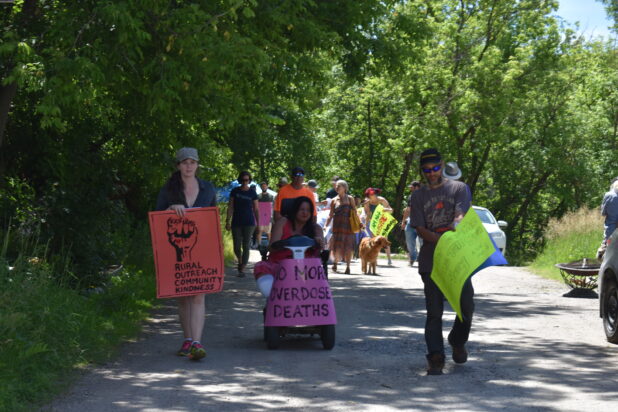Headline News
Second annual silent walk to end overdoses
June 29, 2022

By Kristena Schutt-Moore
All was quiet, but the message was heard loud and clear during the second annual Silent Walk on Friday, June 24.
This annual walk is organized by the North Hastings Community Trust’s Rural Outreach Community Kindness. This program was established to connect with people who use drugs and people who are homeless and/or scarcely housed. The ROCK workers provide information and referrals, someone to talk to, harm reduction kits, support and basic needs and supplies. Those interested in more information are asked to call the Trust at 613-332-3657.
The ROCK members organized the walk for a variety of different reasons, but the top three were:
Eight community members were lost to opioid overdose deaths in 2021. This represents 28 per cent of all opiate deaths in Hastings County, even though this community only represents 10 per cent of the county’s population.
The County of Hastings’ 2021 Homelessness Enumeration found the majority of respondents (71 per cent) identified as having a mental health issue, and 60 per cent reported having substance use problems.
The 2021 Homeless Enumeration found people were more likely to have been experiencing chronic homelessness here than anywhere else in the county. Of all those experiencing homelessness 20 per cent were located in Bancroft, even through this area has only 10 per cent of the county’s population.
To break the silence and the stigma around opioid use and start conversations about it, the participants walked from the Trust at 23 Bridge Street down Hastings Street. Many carried handmade signs and handed out flyers to those who stopped and asked what the walk was about.
The group walked to the crosswalk located at the corner of Madawaska Street and Hastings Street to make their return trek back to the Trust office.
The participants hoped to raise awareness about opioid addiction and prevent any more loss of life while demanding action from government officials. On the fliers participants were handing out it says, “Bancroft is experiencing the ongoing effects of a toxic drug supply and housing crisis. As community members die and suffer, we experience silence from the government and ongoing lack of action.”

















